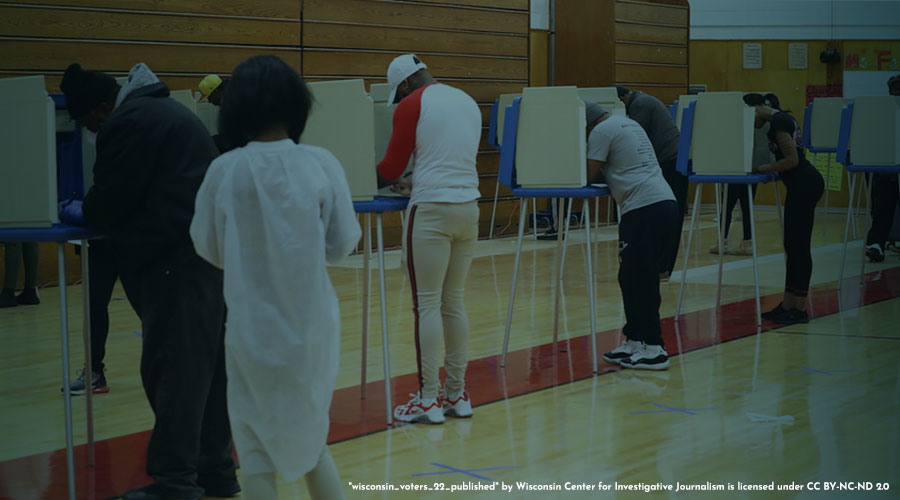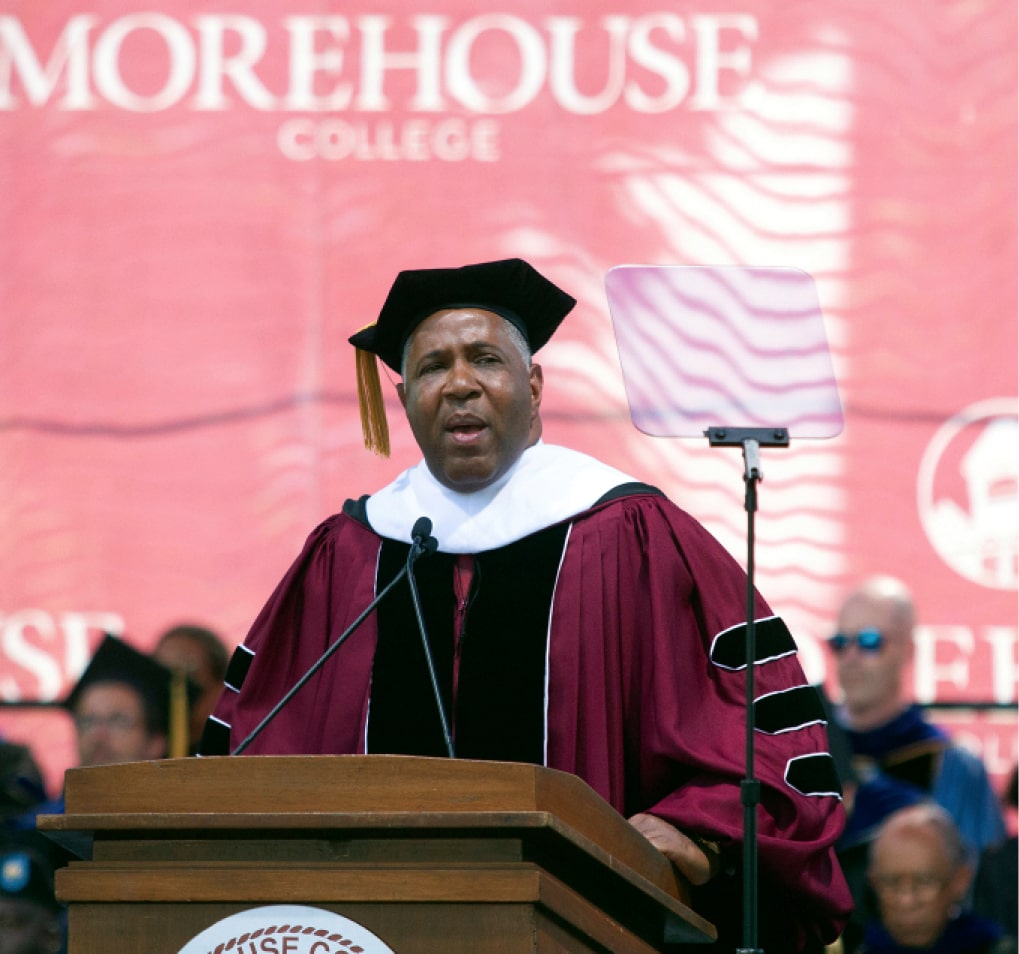Rev. Dr. Bernice King, CEO of the King Center and daughter of Rev. Dr. Martin Luther King Jr., hosted a Beloved Community Talk on the topic of voter suppression, in order to educate the public and provide facts for voters across the country. The talk, “Voter Suppression: A Human Rights Issue or the Battle for the Ballot,” which is in two parts, continued with a discussion on corporate responsibility with Ken Chenault, Managing Director of venture capital firm General Catalyst Partners and former Chairman and CEO of American Express as well as Robert F. Smith. Chenault and Smith were signatories on the historic letter by 72 Black executives which called on companies and business leaders to oppose the new restrictive voting bills introduced in approximately 43 states following the outcome of the last election cycle.
King began the first half of the discussion by introducing Al Vivian, President and CEO of Basic Diversity, Inc. In 1965, Vivian’s father, Rev. Cordy Tindell “C.T.” Vivian was beaten on the steps of the courthouse for attempting to register to vote in Selma, Alabama.
“That was 56 years ago, and on March 25th, 2021, ironically Governor Brian Kemp signed into law SB202,” King said. “[…] there is a battle brewing in our nation right now, not just because of the law that Governor Kemp signed into law, but so many other laws that are still waiting to be decided upon in Legislatures across this country.”
King’s guests also included LaTosha Brown, co-founder of Black Voters Matter Fund and the advisory group TruthSpeaks Consulting, Inc. along with Congresswoman Nikema Williams, who follows the late great John Lewis in representing Georgia’s 5th district in Washington. They clarified what SB202 really is and what people can do at the community level to push back against voter suppression.
What Does Voter Suppression Look Like?
The Georgia bill SB202, which was signed into law in the face of public outcry, enables voter identification laws, shortens the time period in which voters can request absentee ballots, and would restrict any attempts by community organizers to ameliorate voters subjected to long voting lines with water, food or even folding chairs.
Williams called SB202 “the most flagrantly racist, partisan power grab in modern Georgia history,” in a March 25th Tweet. She defined ‘voter suppression’ during the Beloved Community discussion as any attempt to increase the level of difficulty it takes to vote or “what is punitive to certain populations.”
Some examples of changes in Georgia voter law under SB202:
- Before: Georgia voters could just sign their absentee ballot applications.
- After: Georgian voters have to provide a driver’s license or state identification number. Barring that, they must provide proof in the form of birth certificates and social security card numbers.
- Before: The Republican Secretary of State sent absentee ballot applications to all registered voters before the June primary, leading to record numbers of absentee votes. There was nothing to prevent the state from mailing general election applications, though the state did not do so. Instead, local government agencies mailed them with help from third parties.
- After: Third-party groups are barred from helping send out applications to voters.
- Before: There were 94 drop boxes distributed across Fulton, Cobb, DeKalb and Gwinnett countries, accessible outdoors 24-hours a day.
- After: Just 23 drop boxes are now allotted to those predominantly Black counties. And the drop boxes are to be kept indoors at government buildings and early-voting sites, and therefore subject to their hours of operation.
Other restrictions include that mobile voting (voting that takes place in specially outfitted vehicles that can travel to inaccessible neighborhoods) only be allowed in an emergency and changes to early voting which mean fewer day-shift workers will be able to get to polls before they close.
But the most “egregious” part of the bill according to Williams and Brown was that the bill empowers the state government, now controlled by Republicans, to override the Secretary of State and county boards of elections “if they aren’t satisfied” with election results.
Brown said, “all of the elements of the bill are evidence of impact on communities of color” and created to suppress voters in the wake of a historic turnout in 2020 and the January 2021 run-off elections.
What Can Communities Do About Voter Suppression Bills
“The times have changed. Access needs to change,” King said regarding the history of voting access which has changed in the past to accommodate certain voting groups and varies by state.
“Voting should be standardized,” Williams agreed, adding that voting should accommodate everyone in the country, no matter where they live.
King asked her guests about federal legislation that has been introduced in the U.S. House of Representatives: HR1 and HR4. The bills are an attempt to standardize the voting process across the country.
- H.R.1 – For the People Act of 2021: A bill addressing voter access, election integrity and security, campaign finance and ethics for the three branches of government.
- If passed, it would expand voter registration to include both automatic and same-day registration and protect voting access, including vote-by-mail and early voting. It would also limit the removal of voters from voter rolls.
- Voting Rights Advancement Act of 2019: Also known as “The John Lewis Voting Rights Act,” is a bill passed by the U.S. House of Representatives in 2019 which is waiting for a vote in the Senate. The bill was drawn up to restore, repair and strengthen the Voting Rights Act signed into law in 1965.
- The bill specifically restores and improves upon a section of the original VRA which required certain states or jurisdictions with an established history of discriminatory laws or policies to obtain advance approval or as the bill states, “preclearance” from the U.S. Department of Justice or the U.S. District Court for D.C. before they can make any changes to voting practices or procedures.
King and her guests urged viewers to get informed about these bills and the hundreds of other laws introduced in state legislatures, educate others and contact representatives.
Ken Chenault and Robert F. Smith Tackle Corporate Responsibility
Smith appeared with Chenault in the second segment of the “Battle for the Ballot” event hosted by King. Chenault, one of the organizers of the “Memo to Corporate America: The Fierce Urgency,” and Smith provided insight into the development of the letter and the conversations behind the scenes.
Smith brought up the fact that unlike in the 1960’s, and because of the successes of the Civil Rights movement, there are now people of color in corporate positions of power and influence. “Now that we are there, we have to feel not just privileged to have an opportunity to take care of our individual families,” Smith said. “But to understand that it is our ‘Beloved Community’ that we are responsible for.“
Chenault cited Smith’s remark about being “in the room where it happens” as he continued, “When you are in the room and at the table, what are you doing to move things forward?”
King said such acts called for courage, when she asked what challenges the letter signees faced.
Some who were hesitant to sign the letter said they were concerned about retaliation according to Chenault, who recalled that he told them, “There is nothing more fundamental than the right to vote. If we are going to stand on an issue, this is the issue.”
But Chenault said it was important not to ostracize those who didn’t sign, but encourage them to take risks on social issues as we do in business.
“Let’s be clear. There will likely be some backlash that many of us will receive over time,” Smith said, addressing the impact on individuals who participated. “Some of it will be blatant and we will see it, and some, like all things, will be subtle.”
Smith made it clear that whatever the feedback signees receive, it does not compare to the sacrifices of the generation of freedom fighters, like Rev. Dr. Martin Luther King, Jr. who gave their lives for the cause of liberation.
May 17, 2021 marks the 64th anniversary of Dr. King’s first national address, “Give Us the Ballot,” at the Prayer Pilgrimage for Freedom at the Lincoln Memorial in Washington, D.C. Find out more about Dr. King’s legacy and the Civil Rights movement.







